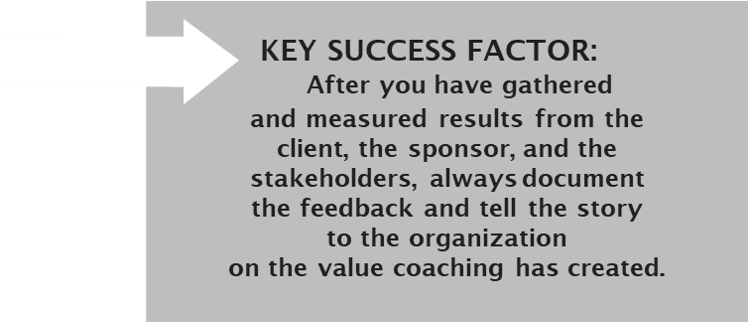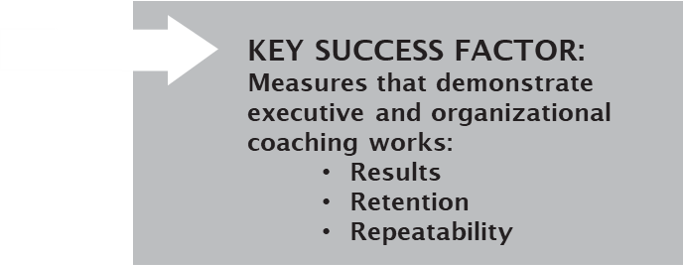Results, Retention and Repeatability Create Value

Organizations that contract with external executive coaches or hire in-house coaches make a significant investment of both time and money. Company leaders want to see tangible results from their investment. They want to see the benefit of coaching.
Because more and more organizations are turning to coaching as a catalyst for igniting higher-level performance, company leaders are asking tougher questions about how their people will be coached and measured.
Bottom line, what they are asking is “how will I really know that the person being coached is making the changes necessary to get promoted to the next level?”
Quantifying the benefits of executive and organizational coaching is more important than ever. This requires coaches to work with the people and teams coached to create and communicate the story of change.
This story involves more than documenting the number of coaching sessions and a client’s opinion of progress. The story involves a report on several outcomes such as: how the client set goals and worked toward achieving those goals, the client’s individual development plan, tangible evidence of new work that was completed, perception by others of behaviors that have changed, new personal client insights that are shared with the manager and how the results impact the organization’s goals. This body of evidence forms the foundation of the return on investment story that should accompany any coaching engagement.
The real question is, “how can I show that coaching provides value to my organization?”
Best Practices in Measuring ROI
Follow these six steps for the best coaching ROI measurement practices:
- Agree on outcomes
- Agree on how the outcomes will be measured
- Create alignment between target outcomes and business goals
- Involve relevant stakeholders in supporting the outcomes and measurements; review progress along the way
- Measure results against the desired outcomes
- Tell the story

The International Coaching Federation (ICF) has an annual award, the Prism Award, that honors businesses and organizations with coaching programs that fulfill rigorous professional standards, address key strategic goals, shape organizational culture and yield discernible and measurable positive impact. Local ICF chapters may also have a Prism Award. As an example, the Minnesota ICF chapter grants a Prism Award in alternating years. As with the international organization, the criteria for winning the local Prism Award includes telling the coaching story and demonstrating measurable results and positive impact on the organization.
In 2018, ICF Minnesota awarded the Prism Award to Medtronic. Medtronic was recognized for coaching programs that have significantly increased engagement, shaped the leadership culture, and delivered a return on investment (ROI) of over 200%. In 2020, Twin Cities Orthopedics (TCO) won the ICF Minnesota Prism Award. You can read more about TCO’s achievements by clicking on the link below:
https://icf-mn.clubexpress.com/content.aspx?page_id=22&club_id=907122&module_id=384994
In both the Medtronic and TCO award nominations, I had the pleasure of working with the coaching leaders involved, encouraging them not only to apply for the award and tell their organizational stories, but also helping them articulate the ROI of coaching in the nomination process. I’ve been involved in other organizational and team coaching initiatives as well. Each time, the enterprise involved has been able to demonstrate results, improve retention, and instill repeatable methods for success that propel growth when the coaching engagement concludes.

How can coaching help you achieve your organizational goals and show the ROI and value generated in the process?
##
This post includes material from the book, Accelerating Leadership, co-authored by Lance Hazzard and Eric T. Hicks, Ph.D., published in June 2019 and available as an e-book. More details and examples of ROI can be found in the book.
Lance Hazzard, CPCC, ACC, is a certified Intelligent Leadership Executive Coach helping people and organizations achieve success. He is Executive Coach and President at Oppnå® Executive & Achievement Coaching. More information can be found on the book, Lance and Oppnå® Coaching at the links below: